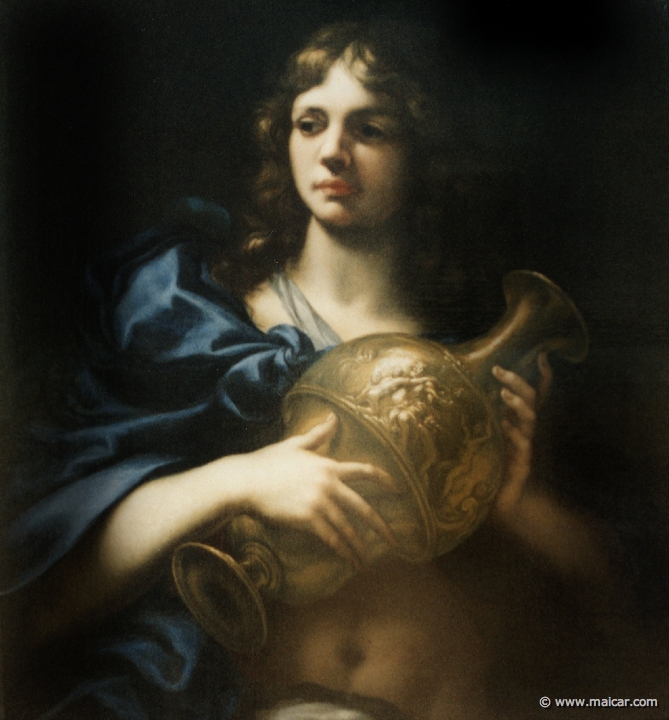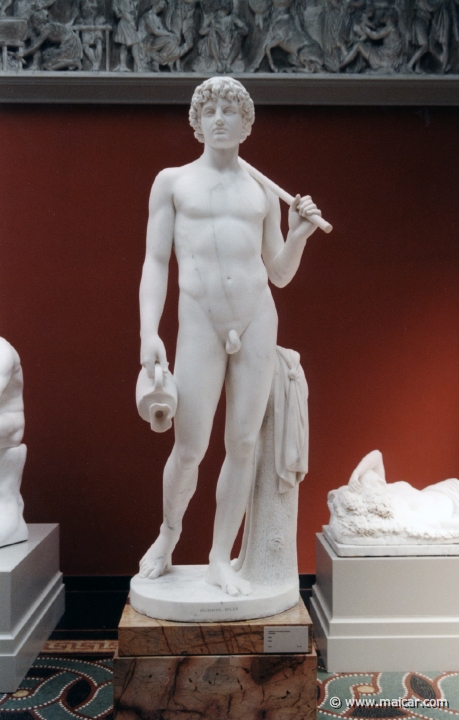|

|
Hylas goes to fetch water for the last time. 0834: Painting by Baldassare Franceschini, called J. C. Volterrano, 1611-1689. Staatsgalerie, Stuttgart.
|
|
Hylas was the young man whom Heracles 1 loved. He
was ravished away by NYMPHS in Mysia on
account of his beauty, and was never found again.
One of the ARGONAUTS
Hylas joined, along with his friend Heracles 1, the
expedition of the ARGONAUTS that sailed
to Colchis, in the eastern coast of what is today
known as the Black Sea, in order to fetch the
Golden Fleece. Very soon he became famous for
having mysteriously disappeared without leaving any
trace when the ARGONAUTS came to
Mysia in Asia Minor. There he was sent to fetch water, and was
ravished by NYMPHS on account of his beauty. But nobody saw anything, and no traces of him were ever found. According to what has been reported, when this happened, the Argonaut Polyphemus 1 heard Hylas cry out. They say that he then took his sword believing that the handsome young man had been attacked by robbers, and went searching for him. Polyphemus 1 did not find Hylas, but instead fell in with Heracles 1, and told
him that something had happened to their comrade.
Three ARGONAUTS lost for the expedition
Heracles 1 and Polyphemus 1 started then a fruitless search, for Hylas was never seen again. And as they were busy searching for Hylas, they were themselves lost for the rest of the ARGONAUTS, and the
ship put to sea. Others have said that Hylas went to fetch water
in the river Ascanius while Heracles 1 was cooking
for the ARGONAUTS. As
Hylas never returned (and they again say that the NYMPHS of the river
captured him), Heracles 1 left the ARGONAUTS, and not
knowing why his friend had vanished, went around
searching and calling his name aloud.
Turned into an echo
Now, some believe that the NYMPHS, fearing that Heracles 1 would
finally find him, turned Hylas into an echo, so
that when Heracles 1 called "Hylas", he would hear "Hylas" back. They
add that Heracles 1,
having done the impossible in order to find his
friend, returned and joined the rest of the ARGONAUTS, but that he left Polyphemus 1 in charge of looking for the young man.
"Hylas, Hylas, Hylas ..."
But Polyphemus 1 died an old man without ever finding Hylas, and it is said that later sacrifices were offered by the locals to celebrate Hylas, in which the priest called him thrice "Hylas, Hylas, Hylas ...", receiving, as before, the same answer from the echo: "Hylas, Hylas, Hylas ..."
Hylas made immortal in a cave
Still others have said that Heracles 1 was hunting
when Hylas, hiding himself, followed him. However,
they say, Hylas lost his way, and wandering through
the woods, he came to the cave of the NYMPHS. When these saw
the young beauty approaching, they captured him in
order to make him immortal and ageless. As the
winds were then favorable, the ARGONAUTS decided to sail away, and it was Polyphemus 1, who climbing a rock, called the two absent ARGONAUTS for the last
time without receiving any answer.
|

|
Hylas was lost when he went to fetch water. 4911: Hermann Wilhelm Bissen 1798-1868: Hylas, 1846. Ny Carlsberg Glyptotek, Copenhagen.
|
|
Plunged into the spring
It has also been told that Hylas, when he went
to fetch water with a pitcher of bronze in hand for
the evening meal, came to the spring called Pegae.
They said that the dances of the NYMPHS were then just being held when he arrived, and that a naiad, who some call Dryope 4, was just rising from the spring. It was night, for they tell that the full moon beams smote Hylas' face. This naiad, it is told, fell immediately in love with Hylas, and when he dipped the pitcher in the stream, she laid one arm around his neck, yearning to kiss him, and with her other hand she drew him down and plunged him into the water.
Spicy gossip
This is what happened to Hylas. And because he
and Heracles 1 were so
close friends, they were believed to be lovers, and
became the object of all kinds of spicy gossip. For
many have thought that Heracles 1's strong
complexion fitted perfectly the delicate beauty of
Hylas. There have also been those who have found of
the utmost interest to know all details about what
is really going on in those chambers which they are
not allowed to enter. And some, condemning these
relationships, have refused to call them love. So, for example, a wise man from Alexandria (not
for being born there, but because he was a priest
in that city), being in possession of knowledge
about the gods, and about the only God, and about
the true nature of things, gave his opinion on
these matters, more than one thousand years after
Hylas' time, with these words:
"For your gods
did not abstain even from boys. One loved Hylas,
another Hyacinthus, another Pelops, another Chrysippus, another Ganymedes. These are the gods your wives are
to worship!" (Clement of Alexandria, Exhortation
to the Greeks 2.28P).
And he could have added that this was the hate of love, the irreligiosity of religion, the profanation of worship, the shame of pride, the debauchery of abstinence, the scandal of solemnity, the vice of virtue, the adultery of fidelity, and the lasciviousness of decency. But being a better writer, he proceeded instead
to demonstrate that women, being no better than men
in these tales, rush as eagerly as them, after
sexual delights.
Powerful god
Now, Love is a god
impossible to catch. For he accepts instructions
from nobody and disregards, when he pleases, human
wisdom, which is for the gods as that of apes is
for men. And Love being
everywhere, he assumes different forms. But those
who seek to hurt and force others through
persecution do worse, and therefore make themselves
inferior to those, who accepting the command of Love as they understand it
and feel it, live happily themselves in common
agreement, neither hurting nor forcing anyone.
|